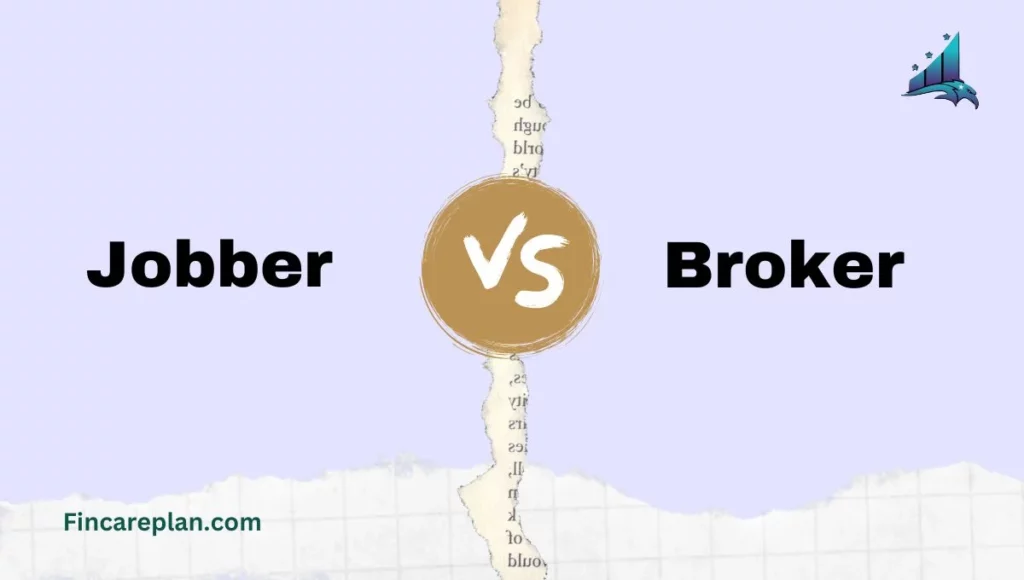Table of Contents
ToggleA jobber is a stockjobber who acted as a marker maker during the mid 1980s. Their roles are seamlessly impressive in that they have balanced the liquidity of the stock market while buying or selling a stock at the London Stock Exchange. They are wholesale buyers or sellers who earn profits from their stocks.
A broker is a stockbroker who acts as a middleman between the client and stock jobbers to buy or sell securities. They earn commissions on each sale or buy.
Difference Between Jobber and Broker
| Jobber | Broker |
|---|---|
| An unlicensed special agent. | A general agent. |
| Acts as a market maker. | They act as a broker. |
| Wholesalers of buying or selling primary securities. | Doing trade only in retail mode. |
| Not involved in direct selling. | A registered and authorised broker involved in direct selling on behalf of clients. |
| Direct dealing with clients is not possible. | Dealing with clients directly. |
| Earnings are measured as profits. | Earnings are measured as commission. |
| Their area of business mainly focuses on the secondary market. | Their area of business mainly focuses on the primary market. |
| They bought or sold the stocks in their account and name. | Buys and sells the securities on behalf of investors. |
Primary Role
The functions of a jobber include buying or selling the stocks wholesale in his own name and trading account. Their trading activities are done in the secondary market by which they profit greatly. They are called a market maker who balances the liquidity of buying and selling stocks.
In contrast to them, brokers are a middleman between the investors and the jobbers. They are directly involved in the primary market by buying or selling stocks from the jobber on a retail basis so that they can earn their commissions for buying or selling the securities on behalf of investors.
Relationship with Investors
A jobber cannot handle the retail customers on their own. They are prohibited to do that. Meanwhile, a broker can have a good relationship with investors because they are registered mercantile retail agents who do trading activities on behalf of investors.
A broker is a link between the investor and the jobber. Whereas a jobber is an independent market maker who is trading securities for their own. So the process is simple. The first is an investor the second one is a broker and on top of that, there comes the jobber. The jobber is at the hierarchy position but the broker helps investors to buy or sell stocks.
Execution of Trades
If a broker has so many investors or clients who want to sell or buy the securities of one organisation. The broker alone doesn’t have access to buy or sell the securities on his own. So he asked the Stock jobber who already had the shares or stocks in bulk.
The stock jobber in turn sells the units at a little higher price than the purchase value. So that he earns some profit from the sale. Then the broker earns a commission from the investor for this trading activity.
Risk Exposure and Profit Margins
Jobbers are always a special merchant who buys or sells stocks in bulk quantities. So that they take higher risk in hoping that the stock may provide good returns in long term holding. Because of his higher risk exposure, he earned a large amount of profit for his trading activity.
But in turn, brokers always bear lower risk so that they can get a better commission rate according to their investors’ gain. So they earned a decent commission amount from the investors.
Regulatory Oversight
Generally speaking, a jobber is an unlicensed individual who carries out trading activities for his own sake. So he is not bound to any rules and regulations for undertaking trading. However, this did not apply to the broker.
Because a broker acts as a link between the investor and the jobber. He must be an authorised and licensed person who has the right to undertake trading activities in the market on behalf of investors.
Market Interaction
As the name describes, a jobber is a market maker who maintains the liquidity of the market. He was directly involved in the market, buying and selling stocks of his own. However, a broker acts as an exchange partner who facilitates his investors to buy or sell their shares.
Conclusion
The value and job of a jobber are not available today. It is taken over by the Brokers to get more advantage from the commission they are earning. Due to digitalisation, many online platforms allow investors to involve themselves in the trade process.
Both play a vital role in the share market in buying or selling the shares.
The tremendous changes in this digital era also changed the way of trading. The brokers replace the position and place of jobbers to enjoy the benefits of commissions in the long term.
FAQs
-
How do jobbers and brokers contribute to market liquidity?
The jobbers always involved themselves in trading activity to enhance the liquidity of the market by selling or buying shares. Whereas brokers maintain a connection between investors and jobbers to smoothen the transactions involved in the market.
-
Can a single entity act as both a jobber and a broker?
No. A single entity cannot act as both a jobber and a broker. A jobber is an unlicensed individual or firm doing trading activity but a broker is a registered agent who makes the transactions smoothly.
-
How do jobbers and brokers interact in the financial markets?
The jobber buys or sells the shares in bulk quantity whereas the broker acts as a connection between the investor and the jobber to make smooth transactions.
